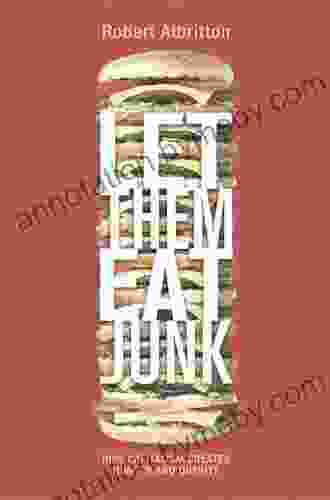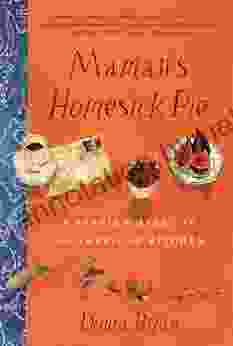Unveiling the Dark Truth: How Capitalism Fuels Hunger and Obesity

The modern food system is a paradox. Despite unprecedented agricultural production, hunger and obesity coexist, affecting billions of people worldwide. This article delves into the intricate relationship between capitalism and food insecurity, exploring how the pursuit of profit and economic growth has fostered a system that perpetuates these two extremes.
4.3 out of 5
| Language | : | English |
| File size | : | 666 KB |
| Text-to-Speech | : | Enabled |
| Screen Reader | : | Supported |
| Enhanced typesetting | : | Enabled |
| Word Wise | : | Enabled |
| Print length | : | 272 pages |
Capitalism and the Paradox of Hunger
Capitalism, an economic system driven by private ownership, profit, and competition, has profoundly shaped the global food system. While it has led to increased productivity and new technologies, it has also created structural inequalities that contribute to hunger.
- Profit Prioritization: Food corporations prioritize maximizing profits over ensuring food access for all. This can lead to food production focusing on high-value, processed foods instead of nutrient-rich staples.
- Food Speculation: Global food markets are subject to speculation, where investors buy and sell commodities like grain futures. This can lead to price volatility and food shortages, making essential foods unaffordable for many.
- Unequal Land Distribution: Capitalism often leads to the concentration of land ownership in the hands of a few large corporations. This can displace small-scale farmers who provide a significant portion of the world's food.
Obesity in the Shadow of Capitalism
While hunger persists in many parts of the world, obesity has become an alarming pandemic in capitalist societies. The abundance of processed, energy-dense foods, coupled with sedentary lifestyles, has contributed to this crisis.
- Processed Food Dominance: Capitalism favors the production of processed foods, which are often high in calories, sugar, and unhealthy fats. These foods are heavily marketed and widely available, making them an easy choice for consumers.
- Food Advertising: Corporations spend billions on advertising to promote processed foods, targeting vulnerable populations with irresistible marketing campaigns.
- Sedentary Lifestyles: Advanced capitalism has led to increasingly sedentary lifestyles, with jobs and leisure activities requiring less physical exertion. This lack of movement contributes to weight gain.
Breaking the Cycle
Addressing hunger and obesity in a capitalist system requires fundamental changes in the way we produce, distribute, and consume food. Here are some transformative approaches:
- Fair Food Policies: Governments must implement policies that ensure fair food prices, support small-scale farmers, and promote sustainable agriculture.
- Nutrition Education: Consumers need access to nutrition education to make informed choices about healthy food. Governments and schools have a critical role to play in promoting healthy eating habits.
- Food Access Programs: Social programs that provide food assistance to those in need should be expanded and strengthened. These programs can include food banks, school meal programs, and government subsidies.
Beyond Capitalism: Envisioning a Food-Just Future
While reforms within capitalism are essential, a more radical transformation may be necessary to create a truly food-just society. Alternative economic models, such as cooperatives and community-supported agriculture, prioritize food security and sustainability over profit.
- Cooperative Ownership: Food cooperatives give producers and consumers more control over the food system, ensuring fair prices and equitable access.
- Local Food Networks: Community-supported agriculture connects consumers directly with farmers, fostering transparency and reducing reliance on industrial food chains.
- Food Sovereignty: Countries and communities should have the right to determine their own food policies and production methods, ensuring food security for all.
The coexistence of hunger and obesity is a stark reminder of the failure of the capitalist food system. By understanding the intrinsic link between capitalism and these extreme conditions, we can demand transformative policies and envision a future where everyone has access to healthy, sustainable, and affordable food.
The book "How Capitalism Creates Hunger and Obesity" provides a comprehensive analysis of this critical issue. It offers a nuanced understanding of the complexities of the food system and empowers readers with the knowledge to advocate for food justice. Join the movement to create a food-just world for all.
4.3 out of 5
| Language | : | English |
| File size | : | 666 KB |
| Text-to-Speech | : | Enabled |
| Screen Reader | : | Supported |
| Enhanced typesetting | : | Enabled |
| Word Wise | : | Enabled |
| Print length | : | 272 pages |
Do you want to contribute by writing guest posts on this blog?
Please contact us and send us a resume of previous articles that you have written.
 Book
Book Novel
Novel Page
Page Chapter
Chapter Text
Text Story
Story Genre
Genre Reader
Reader Library
Library Paperback
Paperback E-book
E-book Magazine
Magazine Newspaper
Newspaper Paragraph
Paragraph Sentence
Sentence Bookmark
Bookmark Shelf
Shelf Glossary
Glossary Bibliography
Bibliography Foreword
Foreword Preface
Preface Synopsis
Synopsis Annotation
Annotation Footnote
Footnote Manuscript
Manuscript Scroll
Scroll Codex
Codex Tome
Tome Bestseller
Bestseller Classics
Classics Library card
Library card Narrative
Narrative Biography
Biography Autobiography
Autobiography Memoir
Memoir Reference
Reference Encyclopedia
Encyclopedia Disney Powless
Disney Powless Patrick Toner
Patrick Toner Don Whitehead
Don Whitehead Leokadia Schmidt
Leokadia Schmidt Donald Bogle
Donald Bogle Shaker Jeffrey
Shaker Jeffrey Pliny The Elder
Pliny The Elder Deepak Malhotra
Deepak Malhotra Don Schreiber
Don Schreiber P Planat
P Planat Michael Mcinnis
Michael Mcinnis Des Hewitt
Des Hewitt Dennis L Thombs
Dennis L Thombs Hector Jaimes
Hector Jaimes Denis Smith
Denis Smith Don Bendell
Don Bendell Richard Nairn
Richard Nairn Missy Amari
Missy Amari Steve Jenner
Steve Jenner Diana Fisher
Diana Fisher
Light bulbAdvertise smarter! Our strategic ad space ensures maximum exposure. Reserve your spot today!

 Grant HayesUnlocking the Mysteries of Blood Coagulation: Pathological Blood Coagulation...
Grant HayesUnlocking the Mysteries of Blood Coagulation: Pathological Blood Coagulation...
 Isaac MitchellStep-by-Step Approach to Competency: Your Guide to Mastering Any Skill or...
Isaac MitchellStep-by-Step Approach to Competency: Your Guide to Mastering Any Skill or... Eric NelsonFollow ·11.1k
Eric NelsonFollow ·11.1k Dominic SimmonsFollow ·4.8k
Dominic SimmonsFollow ·4.8k Jeffrey HayesFollow ·12.5k
Jeffrey HayesFollow ·12.5k Junichiro TanizakiFollow ·16.6k
Junichiro TanizakiFollow ·16.6k Julio CortázarFollow ·10.6k
Julio CortázarFollow ·10.6k Leo TolstoyFollow ·16.8k
Leo TolstoyFollow ·16.8k Chance FosterFollow ·8.7k
Chance FosterFollow ·8.7k Clarence MitchellFollow ·5.5k
Clarence MitchellFollow ·5.5k

 Cruz Simmons
Cruz SimmonsGuide To Pencak Silat Kuntao And Traditional Weapons:...
Immerse yourself in the captivating world of...

 Dalton Foster
Dalton FosterUnlock Your Financial Freedom: Dive into the ABCs of Real...
Are you ready to embark on a...

 George Orwell
George OrwellThe Advanced Guide to Real Estate Investing: Your...
Are you ready to embark on...

 Will Ward
Will WardMargaret Laurence: The Making of a Writer
Margaret Laurence (1926-1987) was one of...

 Jorge Amado
Jorge AmadoThe ABCs of Property Management: A Comprehensive Guide...
Owning and managing rental...
4.3 out of 5
| Language | : | English |
| File size | : | 666 KB |
| Text-to-Speech | : | Enabled |
| Screen Reader | : | Supported |
| Enhanced typesetting | : | Enabled |
| Word Wise | : | Enabled |
| Print length | : | 272 pages |










